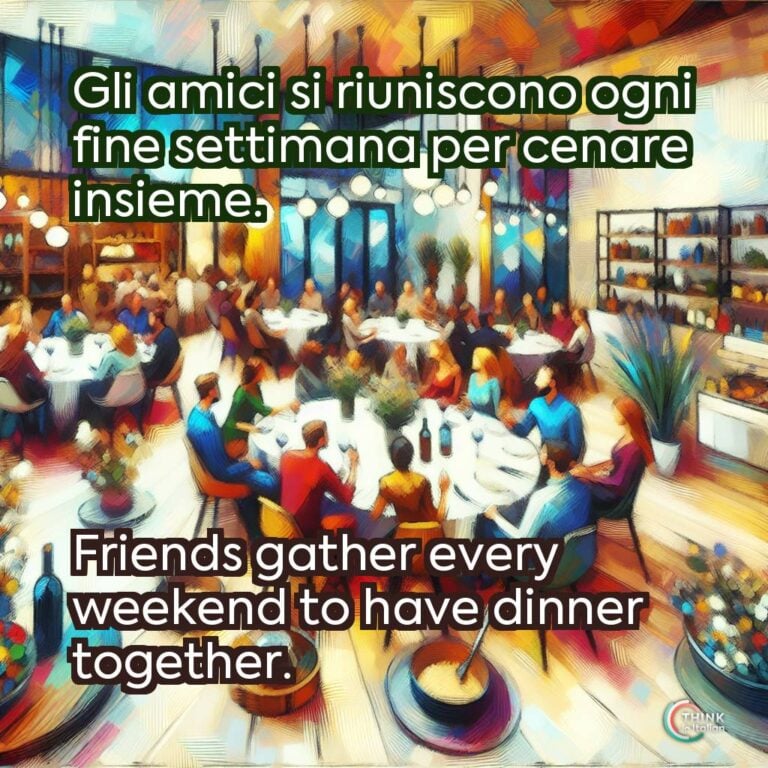“Friend” in Italian
Why I Cherish Friendships as an Italian
As an Italian born and raised in Italy for several years, I have a specific appreciation for what friendship means. In fact, in Italy, friendship and social gatherings are very important.
Italians often emphasize the value of amicizia (friendship) more than most cultures I’ve experienced. We take care of these relationships with loyalty and express our warmth through meaningful gestures.
Most Italians really mean it when they say “chi trova un amico trova un tesoro” (who finds a friend finds a treasure).
Making Friends as an Outsider
I have many friends from abroad, and I always invite them to spend some time with me in Italy whenever I happen to be there. All of them loved my Italian friends!
At first, some of them feel struck by the initial formality and the distinct concept of amico (friend) versus conoscente (acquaintance).
You can make many “conoscenti” in the very first days in Italy, but slowly, through shared meals and laughs, these relationships turn into true amicizia (friendship).
If you are considering or planning to move to Italy and you are afraid of the social aspect of this adventure, do not worry!
Most Italians are very open to meeting new people, and, I must admit it, we are very good at making people feel at ease as if they were at home!
Friends Become Family
In Italian culture, friends often blend into the family. My best friend’s mum is Hungarian, so her parents always go to Hungary for the Easter’s holiday, but my friend must remain in Italy for work.
Can you guess what happens then? She is automatically invited to my house to celebrate Easter together, because she is now part of my family. Italians take friendship seriously!
How to say “Friend” in Italian
Amico: the Noun
The word “amico” is a relatively regular Italian noun. It displays the typical 4 forms (masculine singular and plural, and feminine singular and plural) with the typical endings.
| Singular | Plural | |
| Masculine | Amico | Amici |
| Feminine | Amica | Amiche |
However, as you might have noticed, the “h” is needed in the feminine plural form to ensure that the hard “k” sound is preserved when moving to the plural “-e” form, while in the masculine plural this does not happen.
Another important thing to remember is that masculine is the default gender in Italian, meaning that a group composed of 99 women and 1 man is a group of “amici” (male friends).
It might sound sexist, and in fact an ongoing intense linguistic discussion is taking care of the possible introduction of gender-neutral terms.
This is even more evident with Italian adjectives, since Italian is inherently gendered and requires adjectives and nouns to agree in gender and number.
This grammatical rule impacts the structure of the language, but it can also shape the social perceptions and identity expressions within Italian culture.
Traditionalists believe that these modifications disrupt the linguistic heritage and complexity of the Italian language. Instead, supporters of gender neutrality believe that languages are an important tool for social change and inclusivity.
What do you think about it?
Historical Evolution of the Term
The word amico comes from the Latin “amicus”, which also meant “friend”. What I find interesting is that the Latin root “amicus” is itself derived from the verb “amare” (to love).
Over centuries, the pronunciation of Latin shifted into what became Old Italian: the “-us” ending became “-o”, the typical masculine Italian ending for nouns, while the “-a” ending remained for feminine ones.
Since the Middle Ages, the term “amico” remained close to its Latin roots in standard Italian. In fact, unlike many other italian nouns, “amico” remained stable due to its strong literary and historical roots.
Regional Variation
Even if the standard form “amico/amica” became widely recognized across the country, regional Italian dialects do have different forms of the word.
Each region has its own dialectal term or slang to convey the meaning of “friend”. Here I will list my 3 favorite ones:
- Sicily, Sicilian: Compare
In Sicily, compare (male) traditionally referred to a godparent or a trusted associate, but nowadays this term is used colloquially to mean a close friend or confidant.
- Campania, Neapolitan: Fratm’
In Naples and the surrounding region, “fratm’” (short for fratello mio meaning my brother) is used to mean a close friend, as one would call a brother.
- Rome, Romanesco: Fra’
Just like for Neapolitan, in the Romanesco dialect of Rome, “Fra’” is the shortcut of fratello (brother) highlighting the deep connection that there is among friends.
Generational Differences
In Italy, generational differences shape how friendship is perceived and defined, influencing the terms that are used, the behaviors, and the contexts in which friendships are maintained.
- Older Generations
Older generations of Italians use the traditional terms amico or amica when referring to friends.
For people like my parents and grandparents, friendships often originate from long-term relationships, such as childhood friendships, family connections, or lifelong neighbors.
Regular, face-to-face interactions are emphasized, with friends meeting for coffee, meals, or a passeggiata (stroll).
- Younger Generations
Younger Italians often use more dialectal or informal terms. Among these, “bro”, from the English word “brother”, is taking over in the last few years.
Friendships are often expressed through digital platforms, with interactions via apps, video calls, or social media. In fact, social media influence has led to borrowed terms like “BFF” (best friend forever).
Idiomatic Expressions
Italian idiomatic phrases reveal a lot about the cultural values surrounding Italian people, and friendship is no exception. Here are my favorite idiomatic expressions regarding friendships:
Chi trova un amico trova un tesoro.
Who finds a friend finds a treasure.
- This proverb emphasizes the immense value of friendship, comparing a true friend to a treasure.
L’amico si riconosce nel momento del bisogno.
A friend is recognized in times of need.
- True friends reveal themselves when help is required, showing loyalty and support.
Meglio soli che male accompagnati.
Better alone than in bad company.
- It is preferable to be on one’s own than to be surrounded by untrustworthy people.
Patti chiari, amicizia lunga.
Clear agreements, long friendship.
- Transparency and mutual understanding are key to maintaining lasting friendships.
Dimmi con chi vai e ti dirò chi sei.
Tell me who you hang out with, and I’ll tell you who you are.
- This saying reflects the belief that one’s character can be judged by the company they keep.
Amico di tutti, amico di nessuno.
Friend of everyone, friend of no one.
- Trying to be friends with everyone may leave one without any deep, genuine relationships.
These idioms and proverbs show that Italians perceive friendships as deeply valuable, built on trust, loyalty, and clarity.
Which is your favorite one? Mine is “meglio soli che male accompagnati”!
How Friendships Shape the Italian Identity
At the end of the day, for Italians amicizia isn’t just a relationship, it’s an identity. It’s how people connect with one another and the world around them.
I hope these insights help you see the Italian concept of friendship as not just a relationship status but a deeply rooted part of the culture.
I’m eternally grateful to call my Italian friends not just my amici, but my family.






